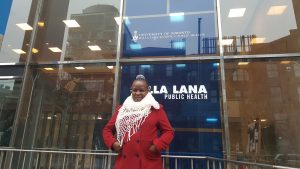Kenyan visiting scholar Grace Wambura Mbuthia reflects on DLSPH experience
January 9/2018
When Grace Wambura Mbuthia arrived at DLSPH in September 2017 as a visiting scholar, she planned on auditing a qualitative research course, using the University of Toronto’s ample library resources to finish her thesis and honing her research skills with faculty mentor support. She didn’t realize how her visit would impact the faculty’s approach to global health education and mentorship.
“I’ve enjoyed my time in Toronto and learned a lot about global health research from professors at the School,” said Mbuthia, who is a lecturer of community health at MOI University in Western Kenya and a doctoral student at the University of Nairobi.
Previously, Mbuthia worked as a nurse at a referral hospital in the Western region of, Kenya — a geographic area known to have higher rates of tuberculosis (TB) than other parts of Africa — and she often saw patients at advanced stages of the disease. TB is the most common infectious cause of mortality worldwide, surpassing malaria and HIV/AIDS. Kenya is currently ranked 13th of 22 high-burden TB countries in the world and has the fifth highest TB infection rate in Africa.
“My doctoral thesis examines health seeking behaviours of Kenyans with TB and why many marginalized people delay seeking care, often six to 12 months after becoming symptomatic,” said Mbuthia.
The reason many people delay seeking treatment, Mbuthia explains, reflects the region’s social determinants of health because TB is both a biomedical and a social disease.
“There’s a lack of awareness about TB and cultural beliefs play a role — many people seek advice from a traditional healer before seeing a doctor,” said Mbuthia.
Since timely diagnosis of TB is key, Mbuthia plans to leverage her research while collaborating with informal healthcare providers to create awareness and shorten treatment pathways, including both traditional medicine and medical treatments while being sensitive to the stigma surrounding TB patients in Kenya.
“Our goal is to engage and educate informal health care providers that if they see someone who has coughed for more than two weeks, they should be referred to a health-care centre,” said Mbuthia.
“At the same time, we want to sensitize the health-care providers to what some of the cultural stigma issues are in remote communities.”
Mbuthia is one of many PhD fellows under the Consortium for Advanced Research Training in Africa (CARTA) that DLSPH has hosted through an organizational partnership. Here she was introduced to Professor Dan Allman, a globally recognized HIV/AIDS researcher, who served as her mentor.
“Grace shared African worldviews and ways of knowing about TB, HIV, and Ebola, as well as health and social care access and service delivery in these contexts,” said Allman, an Associate Professor of Social and Behavioural Health Sciences at DLSPH.
“Her visit helped filter our approaches to education through her real world experiences, and acted as a sounding board or litmus test for the global applicability of our methods and teachings,” said Allman.
Mbuthia’s visit was facilitated by Professor Erica Di Ruggiero with support from her team at the Office of Global Public Health Education and Training through U of T’s International Visiting Graduate Student (IVGS) Study Abroad Program.
“Grace’s visit provided the school with an opportunity to test run its approach to recruitment, education and mentorship of international visiting scholars,” said Di Ruggiero, Director of the Office of Global Public Health Education and Training and Assistant Professor of Social and Behavioural Health Sciences at DLSPH.
Now back in Kenya, Mbuthia plans to leverage her knowledge gained at U of T to mentor her students in community health research and promote health in Kenya.
“I hope to transform the region by continuing my research in infectious disease control and improve the lives of Africans,” she said.

